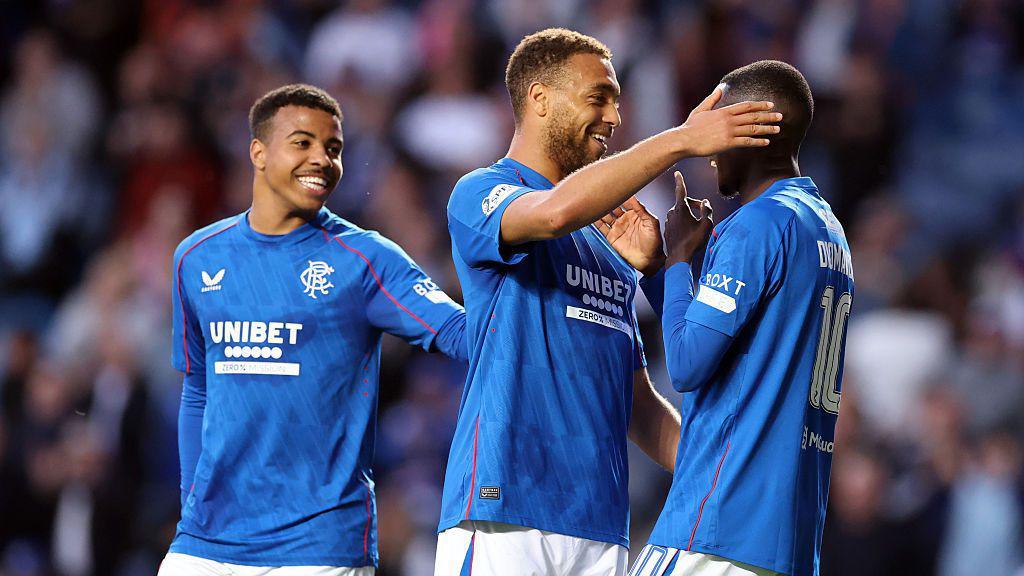Rangers, Hibernian and Dundee United are among 10 teams from the UK who will discover their first opponents in the qualification rounds of the Champions League, Europa League and Conference League this week.
The draws for the first round of qualifying for all three competitions take place on Tuesday, 17 June with the second round qualifying draws a day later.
All three competitions have four rounds of qualifying prior to a league phase.
The three Scottish teams enter at the second qualifying round of their respective competition – Rangers in the Champions League, Hibs in the Europa League and Dundee United in the Conference League.
Northern Irish champions Linfield and Welsh title winners The New Saints both enter the first round of Champions League qualifying.
Dungannon Swifts, who won the Irish Cup, enter the second round of Conference League qualifying alongside Dundee United
The remaining four teams from the UK – Penybont and Haverfordwest County from Wales, and Larne and Cliftonville from Northern Ireland – all feature in the Conference League’s first qualifying round.
Get in touch
How does the Champions League draw work?
The 28 teams in the Champions League’s first qualifying round have been split into two pots – seeded and unseeded.
The New Saints and Linfield are both seeded, meaning that – on paper – they have a more advantageous draw.
Teams they could potentially face include Dinamo Minsk of Belarus, Shelbourne from the Republic of Ireland and Armenian side Noah, who met Chelsea in the group stages of the 2024-25 Conference League.
Should either side advance to the second qualifying round, they will enter the champions path – for clubs who qualified as national champions.
Both teams would enter as unseeded teams, where potential opponents include Danish champions Copenhagen or Slovakian champions Slovan Bratislava.
Rangers enter at this point, but are in a separate section known as the league path.
The Glasgow side are one of three seeded teams in that path and will face either Panathinaikos (Greece), Servette (Switzerland) or Brann (Norway) in the second round.
How does Europa League qualifying work?

Hibernian are the only British side entering either of the first two Europa League qualifying rounds.
As one of eight unseeded sides in the second qualifying round, their potential opponents include Braga of Portugal, Belgian outfit Anderlecht or Midtjylland from Denmark.
PAOK (Greece) and Young Boys (Switzerland) will enter later in the competition, as well as 16 losing sides from earlier qualifying rounds in the Champions League.
How does Conference League qualifying work?

Of the 10 UK teams featured in the first two qualification rounds for Europe’s three club competitions, six are going into the Conference League.
Northern Irish duo Larne and Cliftonville and Welsh sides Penybont and Haverfordwest County all enter the first round.
Larne enter as a seeded team, with the other three sides all unseeded.
Dundee United and Dungannon Swifts enter the second round of qualifying, with the former seeded and the latter unseeded.
Larne are guaranteed to be a seeded side in the second qualifying round, should they get that far.
Nottingham Forest will enter the final round of Conference League qualifying and are guaranteed to be a seeded side in that draw, meaning they will avoid a meeting with Fiorentina (Italy), Rayo Vallecano (Spain), Mainz (Germany) and Strasbourg (France), among others.
What is Ask Me Anything?
Ask Me Anything is a service dedicated to answering your questions.
We want to reward your time by telling you things you do not know and reminding you of things you do.
The team will find out everything you need to know and be able to call upon a network of contacts including our experts and pundits.
We will be answering your questions from the heart of the BBC Sport newsroom, and going behind the scenes at some of the world’s biggest sporting events.
More questions answered…
Related topics
- Welsh Football
- Rangers
- Dundee United
- Northern Ireland Sport
- Scottish Football
- Football
- Hibernian
Source: BBC

Leave a Reply